- Home
- Timothy Egan
The Immortal Irishman
The Immortal Irishman Read online
Contents
* * *
Title Page
Contents
Copyright
Dedication
Epigraph
Introduction: Last Day—July 1, 1867
TO BE IRISH IN IRELAND
Under the Bootheel
The Becoming
Poetry in Action
Pitchfork Paddies
The Meanest Beggar in the World
TO BE IRISH IN THE PENAL COLONY
Island of the Damned
The Traitor of Tasmania
Flight
TO BE IRISH IN AMERICA
Home and Away
Identity
The Fever
War
First Blood
The Call, the Fall
Summer of Slaughter
Reasons to Live and Die
The Green and the Blues
A Brigade No More
A Second Banishment
New Ireland
The Remains of a Life
River Without End
Inquest for Ireland
Acknowledgments
Source Notes
Index
Read More from Timothy Egan
About the Author
Copyright © 2016 by Timothy Egan
All rights reserved
For information about permission to reproduce selections from this book, write to [email protected] or to Permissions, Houghton Mifflin Harcourt Publishing Company, 3 Park Avenue, 19th Floor, New York, New York 10016.
www.hmhco.com
The Library of Congress has cataloged the print edition as follows:
Names: Egan, Timothy.
Title: The immortal Irishman : the Irish revolutionary who became an American hero / Timothy Egan.
Description: Boston : Houghton Mifflin Harcourt, 2016. | Includes bib and index.
Identifiers: LCCN 2015037256| ISBN 9780544272880 (hardcover) | ISBN 9780544272477 (ebook)
Subjects: LCSH: Meagher, Thomas Francis, 1823–1867. | Generals—United States—Biography. | United States. Army—Officers—Biography. | United States. Army of the Potomac. Irish Brigade | United States—History—Civil War, 1861–1865—Biography. | Heroes—United States—Biography. | Irish Americans—Biography. | Revolutionaries—Ireland—Biography. | Prisoners—Tasmania—Biography. | Governors—Montana—Biography. | BISAC: HISTORY / United States / Civil War Period (1850–1877). | HISTORY / United States / 19th Century. | HISTORY / Europe / Ireland. | HISTORY / United States / State & Local / West (AK, CA, CO, HI, ID, MT, NV, UT, WY). | BIOGRAPHY & AUTOBIOGRAPHY / Adventurers & Explorers. | HISTORY / Australia & New Zealand. | BIOGRAPHY & AUTOBIOGRAPHY / Historical.
Classification: LCC E467.1.M4 E34 2016 | DDC 355.0092—dc23
LC record available at http://lccn.loc.gov/2015037256
Cover design by Martha Kennedy
Cover art: Return of the 69th (Irish) Regiment (detail) by Louis Lang, courtesy of the New-York Historical Society
v1.0316
In memory of the family ancestors, Egans and Whites,
Lynches and Harrises.
Cast out of Ireland, they found homes in
Michigan, in Chicago, in Montana, in Seattle,
and never forgot where they came from.
We don’t forget, we don’t forget them things, Joxer.
If they’ve taken everything else from us, Joxer, they’ve
left us our memory.
—SEAN O’CASEY, Juno and the Paycock
Introduction:
Last Day—July 1, 1867
Look to the edge of the swollen Missouri in Montana Territory, where the longest river on the continent holds a blush of twilight, to see what becomes of an Irishman just before he disappears. There he is, woozy and paper-legged on the upper deck of a steamboat at anchor. Not like himself. No great witticisms or Homeric allusions as the evening darkens. No stories ending in punch lines that prompt a toast. No snippets of mournful song. Not a jab of nationalistic indignity to rouse a heart. Though his face is bronzed by sun that squats on the high prairie for fifteen hours a day, his color is off: the blue of his eyes dimmed, the polish of his cheeks matted. He glances at the town, Fort Benton, scours the huddle of saloons, dancehalls, outfitters, cathouses and grub shacks known as the Bloodiest Block in the West. He can’t be sure if that shadow, that clank of spurs on boardwalk, is harmless or the herald of an assassin. Saddle-blistered after a long ride through a territory nearly five times the size of Ireland, he should be falling into a deserved slumber. Instead he asks for a book and a gun from a new friend, John Doran.
“Johnny, they threaten my life in that town,” he tells the pilot of the G. A. Thompson. The ship’s guide, after a three-month journey upriver from St. Louis, is honored to host the greatest Irish American of his day. Eight hours earlier, when Doran heard that the Prince of Waterford had dismounted in a cloud of dust at Fort Benton, he immediately sought him out. Was this Thomas Francis Meagher, one and the same? The orator? Meagher of the Sword? The Civil War general? Yes, yes indeed. Meagher apologized for his illness, dysentery that’s been with him for six days. They then spent the evening together, these two, swapping memories of their tortured island nation, sharing dinner, cigars and tea. Now Johnny has a pair of pistols to lend, he says. And just the book for him—a novel to take him back to Ireland. Yet Meagher is still troubled, not ready for bed.
“As I passed today,” he tells Doran, “I heard them say, ‘There he goes.’”
And why shouldn’t the human flotsam of Fort Benton say such a thing? Until a few days ago, he was governor of Montana Territory, ruler of a Rocky Mountain kingdom stretching from the Badlands to the Bitterroots, a place of sudden riches and ever more sudden death. Check that—acting governor, a man in transition. He is still searching for permanence, somewhere to anchor himself. Though his words moved people to risk their lives on three continents, and he looked for a home on four, he never found the place. Always the exile. “I am here alone,” he’d confessed in a love letter some time ago. He had no family in this vast continent, he’d lamented, no boyhood den to disappear into, no place he could find with his eyes closed. Most call him General Meagher, and some can even pronounce it—a single syllable, Mar, an honorable surname from County Tipperary, descendant of tribal chieftains at that. More than once, this General Meagher had stormed into a blizzard of musketry to slay the defenders of slavery. He led the Irish Brigade, the storied castoffs who fought for the Union under a green flag of a harp and a sunburst. Knocked senseless and left for dead in one battle, in another he was left holding a best friend while the soldier’s heart gave out. This was the price to be accepted as an American.
“There he goes.”
He can count the enemies: the Brits, certainly. Meagher is a fugitive, still, in the eyes of the mightiest empire on earth. No matter his U.S. citizenship, his officer’s rank or his marriage to a well-known New Yorker with an impeccable colonial Protestant lineage. This governor is a convict. A wanted man. Another Paddy from the penal colony. Should he try to return to his father’s home along the Suir, the authorities would shackle him to a moldy cell in the Kilmainham Gaol. Then, perhaps, back to Tasmania, where Great Britain had banished him among the brightest of Ireland’s noncompliant political class.
The enduring struggle, dating to the twelfth century, could still cause a dustup in the nineteenth-century American West, 4,300 miles from the wellspring of all the ancient hatred. Meagher’s very existence, defying England’s repeated efforts to bury him, was a threat in the most troublesome part of the Empire. Meagher had shown the world that the Irish could fight, that immigrants and petty criminals from the hard filth of New York and the waterfront warrens of Boston wo
uld risk life in a civil war that was not theirs. And he made no secret of the bigger design: after they finished with the South, these same Irishmen, seasoned soldiers now, would steam across the Atlantic and liberate their homeland. Thomas Meagher, lover of verse, a man who got his start using speech as a weapon, leading the way. Don’t laugh. The Wild Geese—triumphant at last.
More likely, the men who muttered “There he goes” on Fort Benton’s sun-cracked, uneven walkways are enemies from within Montana. Vigilantes top the list. When Meagher arrived in Virginia City with his acting governor’s title, the law belonged to a stiff-collared cabal who’d been there first. By the end of 1865, they had hanged forty citizens in barely two years’ time, leaving the victims to sway from a favored tree for days in case somebody missed the point. Meagher believed that the hasty arrest and secretive sentencing of one poor soul was an outrage—an affront to the American sensibilities that he’d embraced with the guileless fervor of a new citizen. He issued a reprieve, which infuriated the vigilantes. Within a day, a posse grabbed the newly freed man and strung him from Helena’s hanging tree—the governor’s get-out-of-jail card still in his back pocket. Not long afterward, the executioners sent the governor a note, a crudely drawn hangman’s knot, labeled “General Meagher.”
On this lovely summer’s eve, the moon nearly full, the river coursing down-continent at about eight miles an hour, a few kingfishers swooping for prey, Meagher could try to push his suspicions aside. The buoyancy of his heart has long sustained him. Fear, like self-pity, is a prison of its own making. So what if he’s broke, his salary long overdue, his personal funds exhausted from trying to maintain the ragged appearance of government in a lawless land. He’d attempted to make a home from within the chilly claustrophobia of a log cabin in a mile-high shack town—Virginia City, the Montana capital. It was neither a city nor anything like Virginia. He couldn’t pay the doctor who’d treated him for the turmoil in his gut. His credit, that of the U.S. government, would terminate with this last official act: getting a cache of arms from Major General William Tecumseh Sherman, commander of the Army of the West, for use in a conflict with the natives.
Though Meagher was born into wealth, educated at the best schools and raised in baronial splendor, who dined at a table crowded with crystal from his native Waterford, he could count his net worth now, at the age of forty-three, in the hasty scribble of a few sentences. Two horses valued at $40. A stovepipe that might get $90. A note showing $500 owed him in back pay from the government. A few bottles of champagne, books of poetry, a half-dozen cigars. The laughable, leaky little log hut was not even his. The governor’s mansion, hah! But—damn it all—why does money have to be the marker of a man? That was the thing about America he most despised, measuring existence by the size of one’s pile.
Better to think of what could come next in a run of extraordinary luck, a commodity oversubscribed to the Irish. Was there a more tumultuous time to be alive in the two countries he called his own? Meagher didn’t think so. His prayer to an oft-inattentive God—to be part of some Great Purpose and not just a bystander—had been answered. What more could a man want? Well, more. Meagher felt there had to be a coda of grand consequence. He had lived through the genocidal horror of the famine, said goodbye to friends swept out in the migration of two million Irish. He was bound to the penal colony of Australia, had become a free man in the most clamorous of free nations, fought and nearly died trying to hold this new nation together and now was looking for a home under the big sky of Montana. He had known the Liberator of the Old World, Daniel O’Connell, and the Great Emancipator of the New World, Abraham Lincoln. He had lived a dozen lives in his two score and three—lived an abundance of horror and no small number of triumphs. But more than that, he’d shaped his times. There were newly free men and women in the penal colony down under, in part because of him. There were free blacks in America, in part because of him. There would one day be a free Ireland, in part because of him. To escape England’s gallows, Tasmania’s sharks, the Confederacy’s shells, even a train wreck that killed most of the people in his car—this was more than ordinary luck. Surely, something magnificent was still in store for him, something befitting this life.
He misses Libby. The New York beauty Elizabeth Townsend Meagher had walked away from her father’s fortune, turned her back on his religion and his favor, to follow an Irish fugitive. They have become exiles together. “You know the worst,” he had told Libby, in asking her to join him for the rest of his years, “and you know the best.” She had nursed his wounds from Bull Run and Antietam, had protected his good name from the clucks of New York, had resisted her family’s pleadings to give him up for someone more deserving of her status. Better to be an old maid than to marry this felon, she was told. Despite the constraints of the frontier, they were happier this last year in Montana than they had been in some time. After a dozen years of marriage, he was sure of it: he had found his life mate.
Steady, steady on the deck. A look again at the moon over the Missouri, enough light for him to spot an osprey riding an updraft. The river is unfathomably full for summer, carrying runoff, rain and spring water from an area twice the size of France. Meagher had lived by a river for much of his youth—the Liffey, all of seventy-eight miles long, rising in the Wicklow Mountains, flowing past his boarding school, emptying to the sea not far from a den in Dublin where he helped to plot a revolution. So many lives ago. This oversized Missouri, chocolate brown and bulked with reinforcement from the snow-shedding mountains, could make even the most convivial man lonely.
His stomach will not stop churning; it feels clunked. Perhaps a nightcap, then, to make sleep come easier. What would they say? That he was tanked, swaying on the upper deck, the poor son of a bitch. A man couldn’t have a proper drink without someone bringing up the Curse of the Irish. Well, then, just one last look at the river and bid this summer eve good night, with that book awaiting him in bed.
At once a shout goes out, guttural and primal, followed by a splash and another cry. It’s the general’s voice. Doran can tell from the lower deck.
“Man overboard!”
Now the Missouri has Thomas Meagher in its grip; he’s gasping and choking on sediment-thick water. A crewman throws out a line. In an instant, he’s gone, disappeared, not a sound in the vacuum. Away he goes, down the big waterway, past snags and sandbars, to the undercurrents and waterfalls in the gravitational pull of the continent’s eastern half, away to the Mississippi, to the Gulf, to the ages. His vanishing is one of the longest-lasting mysteries of the American West.
His life is the story of Ireland.
PART I
* * *
TO BE IRISH IN IRELAND
1
* * *
Under the Bootheel
For the better part of seven centuries, to be Irish in Ireland was to live in a land not your own. You called a lake next to your family home by one name, and the occupiers gave it another. You knew a town had been built by the hands of your ancestors, the quarry of origin for the stones pressed into those streets, and you were forbidden from inhabiting it. You could not enter a court of law as anything but a criminal or a snitch. You could not worship your God, in a church open to the public, without risking prison or public flogging. You could not attend school, at any level, even at home. And if your parents sent you out of the country to be educated, you could not return. You could not marry, conduct trade or go into business with a Christian Protestant. You could not have a foster child. If orphaned, you were forced into a home full of people who rejected your faith. You could not play your favorite sports—hurling was specifically prohibited. You could not own land in more than 80 percent of your country; the bogs, barrens and highlands were your haunts. You could not own a horse worth more than £5 sterling. If you married an Englishman, you would lose everything upon his death. You could not speak your language outside your home. You would not think in Irish, so the logic went, if you were not allowed to speak in Irish.
Your ancient verses were forbidden from being uttered in select company. Your songs could not be sung, your music not played, your Celtic crosses not displayed. You could be thrown in prison for expressions of your folklore or native art. One law made it a felony for “a piper, story-teller, babler, or rimer” to be in the company of an Englishman. Another six statutes banished bards and minstrels. You could not vote. You could not hold office. You were nothing. “The law does not suppose any such person to exist as an Irish Roman Catholic,” said John Bowes, an eighteenth-century lord chancellor of the island. “Nor could any such person draw a breath without the Crown’s permission.”
The melodies of this nation and its favorite instrument were a particular target of English hatred. At one point, your fingernails could be removed if you were caught playing the harp. The Irish married to the sounds that came from that instrument, and they grieved in some of those same keys. But the indigenous music came to be seen as subversive—too nationalistic, too connected to the old stories. In 1603 it was proclaimed that “all manner of bards and harpers” were to be “exterminated by martial law.” That same year, a few months before her death, it was said in Ireland that Queen Elizabeth had ordered her troops to “hang the harpers, wherever found, and destroy their instruments.” The Virgin Queen allowed Shakespeare and Marlowe to reach great heights during her long reign, but Elizabeth had not a thimble of tolerance for a people she considered primitive. To encourage the elimination of one musical aspect of that culture, the government paid a bounty to anyone who turned in outlaws of the harp. The musicians were easy to round up; many of them were blind, music their only refuge and source of income.
What had the Irish done to deserve these cruelties? They had refused to become English.

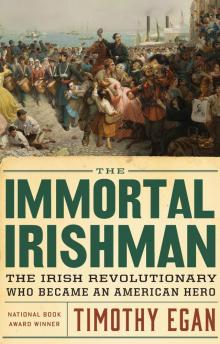 The Immortal Irishman
The Immortal Irishman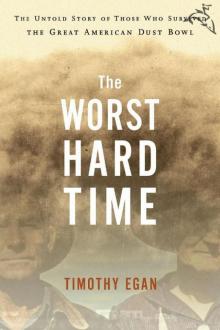 The Worst Hard Time: The Untold Story of Those Who Survived the Great American Dust Bowl
The Worst Hard Time: The Untold Story of Those Who Survived the Great American Dust Bowl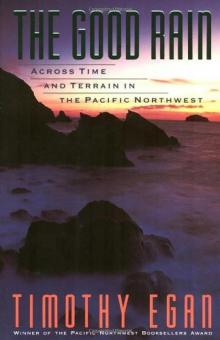 The Good Rain: Across Time & Terrain in the Pacific Northwest
The Good Rain: Across Time & Terrain in the Pacific Northwest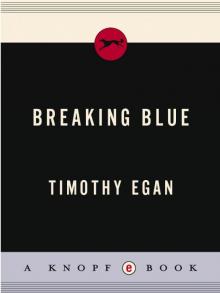 Breaking Blue
Breaking Blue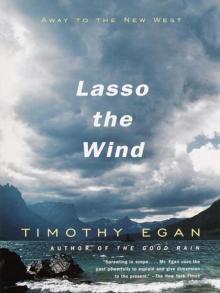 Lasso the Wind: Away to the New West
Lasso the Wind: Away to the New West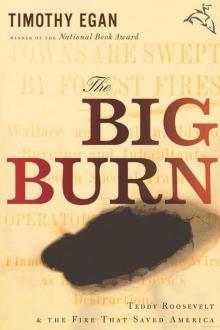 The Big Burn: Teddy Roosevelt and the Fire That Saved America
The Big Burn: Teddy Roosevelt and the Fire That Saved America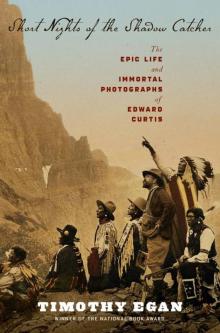 Short Nights of the Shadow Catcher
Short Nights of the Shadow Catcher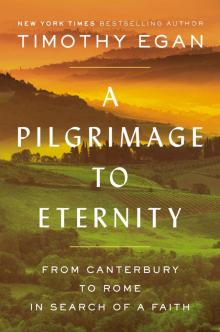 A Pilgrimage to Eternity
A Pilgrimage to Eternity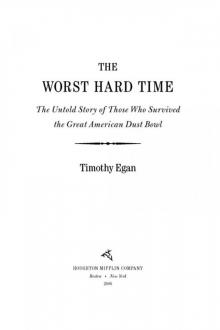 The Worst Hard Time
The Worst Hard Time The Big Burn
The Big Burn